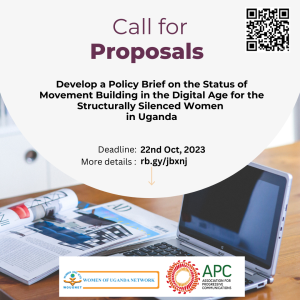In its continuous commitment to fostering digital inclusion and strengthening regional and international collaboration, WOUGNET actively participated in the African Internet Governance Forum (AfIGF) 2025, held in Dar es Salaam, Tanzania. Centered around the theme “Empowering Africa’s Digital Future,” the forum brought together stakeholders from across the globe to discuss inclusive digital development for the African continent. WOUGNET hosted a session titled “Bridging Digital Divides: Advancing Inclusive Access Through Rural Broadband Connectivity Models,” which highlighted innovative solutions aimed at closing the digital connectivity gap in underserved communities.
Co-convened by WOUGNET and its partners, the session showcased the transformative potential of rural broadband initiatives in tackling access inequities. Through an engaging dialogue informed by case studies from Uganda, Kenya, Ghana, Tanzania and South Africa, participants examined community-driven solutions such as solar-powered internet hubs and rural broadband connectivity models. The session demonstrated how locally-rooted and inclusive broadband strategies are enabling digital inclusion in some of Africa’s most marginalized regions. WOUGNET also presented its own rural broadband connectivity project in Northern Uganda, emphasizing real-world applications of these models.
The session also unpacked the complex realities of rural digital inclusion in Africa, acknowledging the persistent infrastructure barriers in remote areas. While telecommunications providers have shown interest in expanding coverage, the lack of last-mile infrastructure remains a significant challenge. The forum emphasized that bridging the digital divide requires context-sensitive, inclusive and sustainable solutions grounded in the lived realities of rural communities.
Participants underscored the value of human-centered design and community ownership in broadband deployment. They called for needs-based approaches that integrate local knowledge and culture, while being reinforced through digital literacy initiatives. Public-private partnerships (PPPs) were critically assessed for often favoring top-down approaches that reproduce structural inequalities. Instead, stakeholders advocated for models that prioritize community stewardship, cultural relevance, and long-term sustainability.
A powerful takeaway from the session was the role of youth as catalysts for innovation. With the right support, trust, funding and meaningful inclusion in governance, young people can build locally relevant digital tools and platforms that address their communities’ unique needs. However, access alone is not enough. Many communities lack the digital skills, confidence, or awareness to meaningfully engage online. Marginalized women, persons with disabilities, and other vulnerable groups face additional challenges, including online gender-based violence, digital safety concerns, and a lack of assistive technologies.
To address these intersecting challenges, the session called for localized, multi-stakeholder policymaking processes that center community voices and experiences. Governments were encouraged to draw inspiration from successful models such as Tanzania’s telco funding scheme for rural access. Policy recommendations included integrating CSO-led broadband initiatives into national strategies, investing in digital infrastructure security, promoting local content creation, and ensuring language inclusion in digital services. The path to equitable digital access will require sustained investment, community participation, and policy reform rooted in local contexts and realities.
WOUGNET’s participation at AfIGF 2025 reaffirmed its commitment to digital inclusion as a foundational pillar of development and empowerment. Through collaborative platforms like the African IGF, WOUGNET continues to elevate the voices of rural and marginalized communities, promote gender-responsive access solutions, and drive meaningful conversations on the future of internet governance in Africa. As the continent works toward a more inclusive digital future, we reaffirm our commitment to shaping a more connected, equitable, and just African digital landscape.





